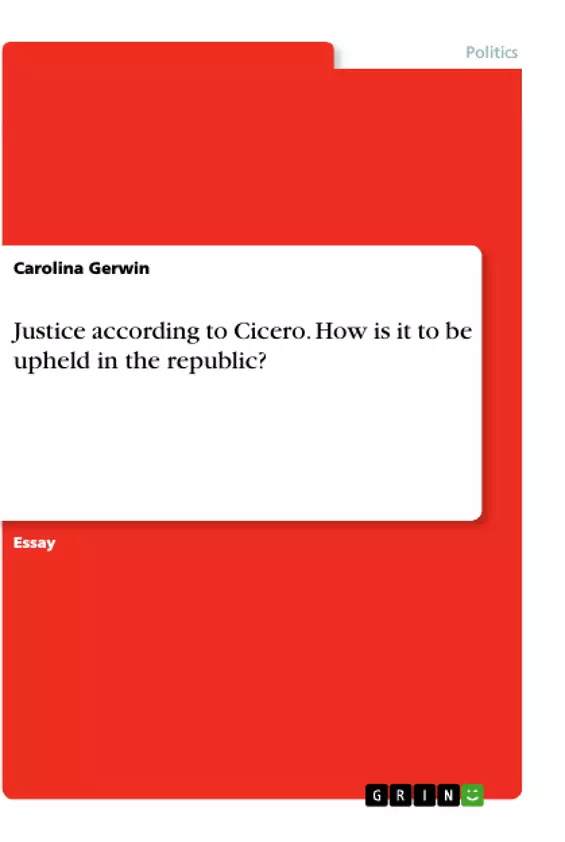This essay complements current literature by discussing what justice is, according to Cicero, and how it is preserved in the republic. It is argued that for the philosopher, justice is the superior virtue among all people that prevails over other virtues and promotes sociability, thereby upholding the community and the state.
Justice is upheld in the republic if everyone acts according to certain rules that are outlined in the paper and if power is divided between the monarchic, aristocratic and democratic elements in Cicero’s account of a mixed constitution. The essay starts by explaining the relevant context, then continues by outlining Cicero’s view on justice, and finally, it discusses how it is preserved in the republic as described in "On the Commonwealth" and "On Duties".
Inhaltsverzeichnis (Table of Contents)
- Introduction
- Cicero’s View on Justice
- Justice as a Political Virtue
- Justice and the Other Virtues
- Conclusion
Zielsetzung und Themenschwerpunkte (Objectives and Key Themes)
This essay aims to analyse Cicero's view on justice and discuss how it is preserved in the republic. The essay explores Cicero's definition of justice and its relationship to other virtues, as well as how it is maintained in the context of a mixed constitution.
- Cicero's definition of justice and its relationship to human nature
- The role of justice in upholding the republic
- The connection between justice and other cardinal virtues, such as wisdom, courage, and moderation
- The influence of Cicero's political context on his theory of justice
- The importance of maintaining a mixed constitution in preserving justice
Zusammenfassung der Kapitel (Chapter Summaries)
- The essay starts by outlining Cicero's view on justice and how it is rooted in human nature. It discusses the concept of "oikeiosis" and its role in fostering sociability. Cicero emphasizes the importance of justice as a superior virtue that promotes unity and serves as the guardian of the state.
- The essay then focuses on the political role of justice. It examines how justice is interwoven with other virtues, such as wisdom and courage, and how these virtues contribute to the stability and flourishing of the republic. Cicero's perspective on the crisis of the Roman republic, marked by factionalism and tyranny, informs his emphasis on the need for justice in maintaining a balanced and just society.
- The essay further explores the relationship between justice and the other cardinal virtues. It discusses how justice can sometimes limit the pursuit of other virtues, particularly in cases of wisdom and courage. Cicero argues that moderation and seemliness, when strengthened by justice, contribute to the overall well-being of the state.
Schlüsselwörter (Keywords)
This essay focuses on the concepts of justice, sociability, mixed constitution, cardinal virtues, and the crisis of the Roman republic. It examines Cicero's philosophical and political ideas, particularly his views on the nature of justice and its role in upholding the state. Other key themes include the relationship between justice and other virtues, the influence of political context on Cicero's theory of justice, and the importance of a balanced and just society.
- Citation du texte
- Carolina Gerwin (Auteur), 2018, Justice according to Cicero. How is it to be upheld in the republic?, Munich, GRIN Verlag, https://www.grin.com/document/510903



